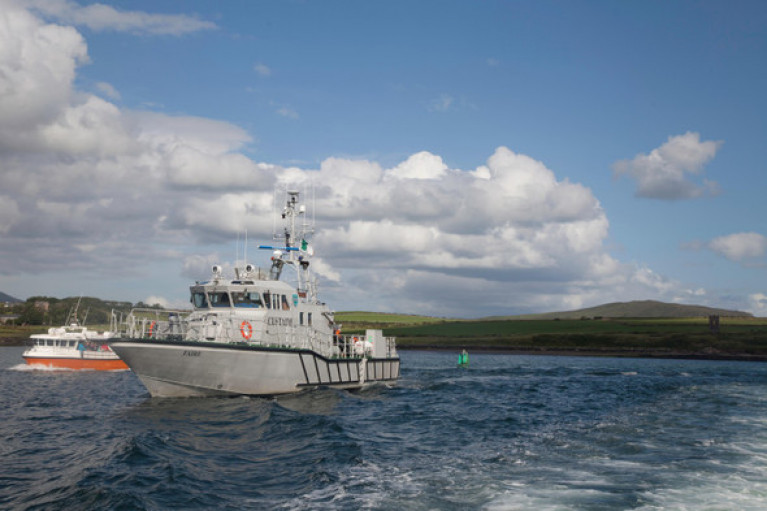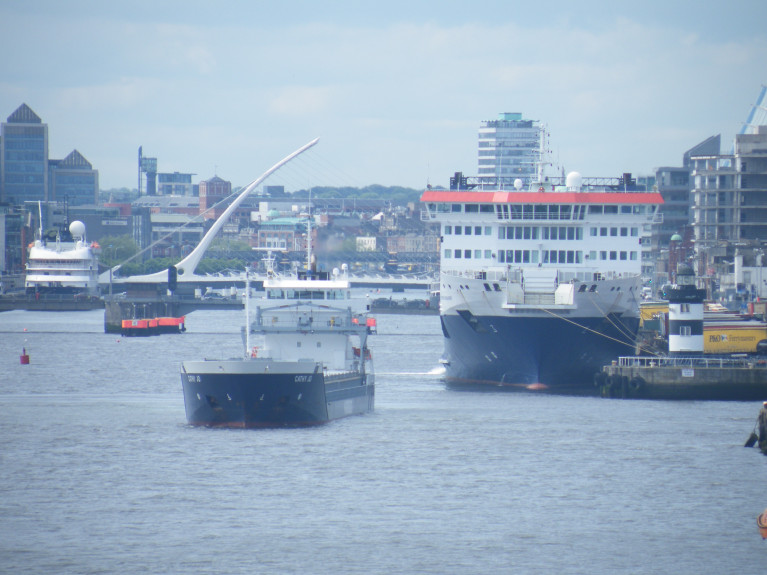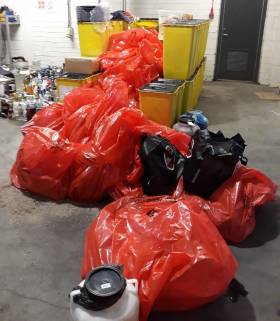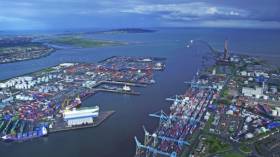Displaying items by tag: revenue
Ship Moored in Dublin Port for Years to Remain Berthed Up to Next Summer
The Revenue Commissioners has said it could be next summer before a ship - which is costing thousands of euro per month in mooring fees - can be moved out of Dublin Port.
As The Irish Times writes, the vessel, which was attempting to smuggle cigarettes, was seized in 2014.
It is called the Shingle - and it has been tied up in Dublin Port going nowhere fast for years now.
The Moldovan vessel was seized by customs officers in 2014, en route from Portugal to Drogheda. On board were 32 million illegal cigarettes.
After legal proceedings, Revenue took control of the vessel.
It had hoped to quickly sell it, but it is covered in rust and asbestos. Scrapping it was deemed too expensive.
The ship has been tied up in Dublin Port ever since, and that doesn't come cheap.
Latest figures, from the Revenue Commissioners, show it has cost €650,000 in total so far.
That's €7,000 per month - mostly made up of in-port and maintenance fees.
"It is a headache," said John McCormack, head of Revenue's logistics branch.
"Nobody is more frustrated than myself in terms of the tedious nature of the progress... I've made it my mission statement to get something done with the Shingle and it's been a priority ever since. I totally understand taxpayers' frustration at this in terms of the cost. The cost is the cost. Revenue were saddled with this in 2017," he said.
Much more the newspaper reports on the vessel which at one stage Revenue offered to tow the ship away and be sunk as a diving visitor attraction off Mayo/Sligo.
Revenue’s New Patrol Vessels Will Boost Sea Rescue Capabilities
Revenue’s plans to acquire two new patrol vessels will boost the State’s coastal and offshore search-and-rescue capabilities, it’s been claimed.
As previously reported on Afloat.ie, the two new ships will replace Revenue’s existing cutters and new used to expand its ability to tackle drug smuggling and other seaborne criminal activities.
 The Revenue Commissioner's existing cutters moored in Kinsale Harbour in West Cork on Sunday Photo: Bob Bateman
The Revenue Commissioner's existing cutters moored in Kinsale Harbour in West Cork on Sunday Photo: Bob Bateman
Now a spokesperson for the Revenue Commissioners confirmed to The Irish Times that the new vessels will also service as needed as diving platforms for Garda and Naval Service divers, and can also play a role in coordinating search-and-rescue operations on the scene.
Pre-tender documents note that the vessels will be fitted with thermal cameras and other specialised equipment that can be employed in a search-and-rescue role.
The Irish Times has much more on the story HERE.
Revenue Commissioners to Spend €20m on New Customs Patrol Boats to Help Tackle Drug Trade
Two new patrol boats are set to be purchased by the Revenue Commissioners. The new vessels will be used, in part, to expand the service’s ability to tackle drug smuggling and other seaborne criminal activities.
The patrol vessels, which sources believe will cost €20m to purchase, will require a tender notice to be issued later this year.
Revenue already has two patrol boats in their Maritime Unit, the Revenue Commissioner Cutter (RCC) Faire and the RCC Suirbheir.
It is understood the RCC Faire is generally based in Dun Laoghaire Harbour in Dublin and the RCC Suirbheir is normally seen operating near Kinsale, Co Cork.
It is believed the arrival of two new vessels, which it’s understood will each have a crew of six personnel, will see the new boats positioned in various ports around the country.
A Revenue spokesperson said the vessels will replace the current boats without any overlap of service.
In response to a query from The Journal (more on the story) a Revenue spokesperson said that a Prior Information Notice (PIN) had been published in the Official Journal of the EU in November, 2021.
Irish Revenue Collect €215m Customs Duty on UK Post-Brexit Goods
In the Revenue’s annual report it confirms a massive increase in red tape now involved in trade with Britain.
Revenue say they collected €215m of customs duty on imports from Britain last year, even before the full impact of Brexit comes into force. That’s equal to nearly half the €526m total of customs duty collected on goods from all other non-EU markets combined last year.
Before Brexit there was no duty owned on imports from the UK and under the terms of the UK’s EU withdrawal Agreement trade between the Republic and Northern Ireland remains exempt.
The Revenue data shows the growing number of barriers to British firms selling into Ireland since Brexit and helps explain why goods imports into Ireland from the UK as a whole have plummeted by 45pc in the past year, while imports from Northern Ireland doubled.
The full impact of the UK withdrawal is still not being fully felt, in significant part because the Britosh government has continually delayed full implementation of the agreement. For more, Independent.ie has the story.
#dublinport - In a joint operation between the Department of Agriculture and Revenue Customs, FarmIreland writes of seized illegal meat at Dublin Port that took place recently.
Some 3.7t of various meat products were seized as they did not comply with EU food safety rules with a potential impact on public and animal health.
The smuggled meat was discovered when officers searched a foreign-registered truck that had arrived in Dublin from Holyhead, having begun its journey in Romania.
The operation also saw Revenue officers at Dublin Port seize 960L of alcohol and 11,640 cigarettes, branded ‘Marlboro’, ‘Kent’ and ‘Pall Mall’, with a retail value of €19,100 which represent a potential loss to the Exchequer of €11,460.
Big Booze Seizure At Dublin Port
#DublinPort - Revenue officials made a significant seizure of alcohol and tobacco at Dublin Port yesterday (Monday 27 February), as BreakingNews.ie reports.
More than 200 litres of wine, beer and spirits, plus some 2kg of tobacco and cigarettes, were seized from two vans arrived separate from France and Holyhead — a potential loss of more than €4,000 to the Exchequer.
Scientists Await Data from Galway Wave Energy Test
The Irish Times reports that a number of European universities and research centres are eagerly awaiting the data from the latest wave energy test buoy deployed in Galway Bay.
Cork company Ocean Energy Ltd is behind the latest test and research platform, co-ordinated by the hydraulics and marine research centre at University College Cork.
The scheme has €4.5 million in funding approved by the EU and commissioner for research and innovation Máire Geoghegan-Quinn.
A recent study for Sustainable Energy Ireland suggests that ocean-derived energy could generate €9 billion in income and thousands of jobs in the next 20 years.




























































